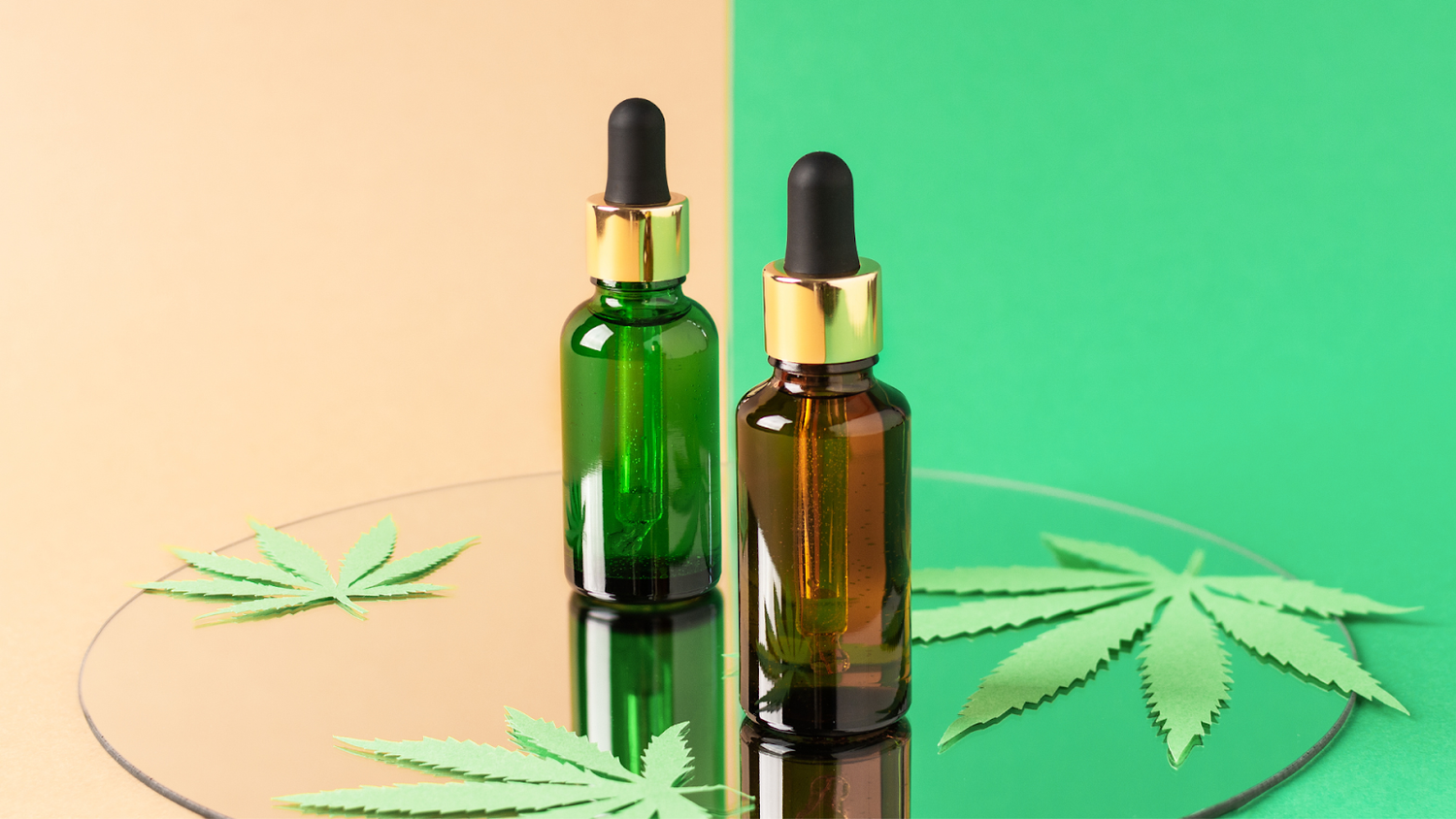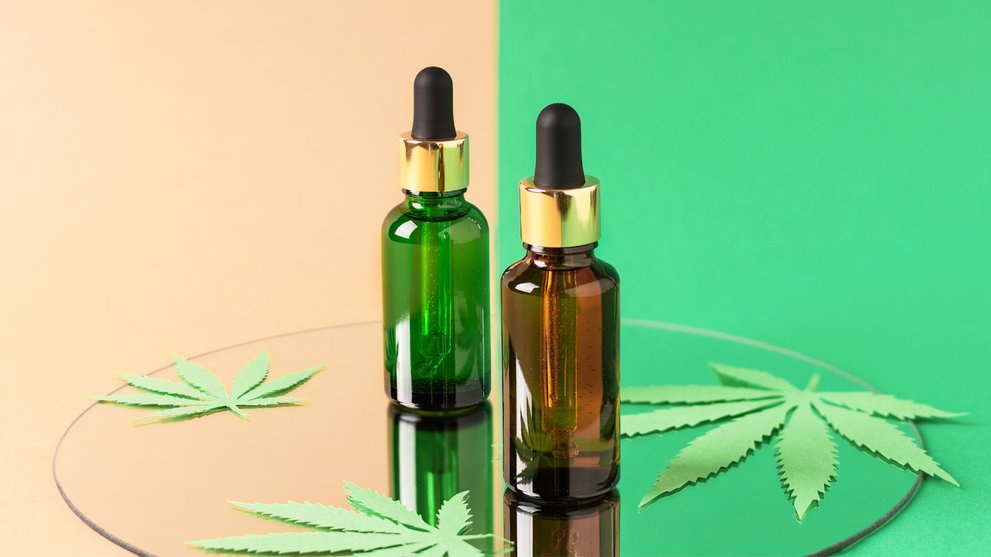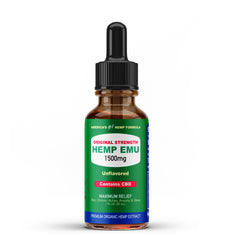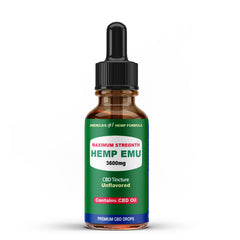Key Takeaways:
- Cannabinoid Differences: CBD and CBG are both non-intoxicating but have unique interactions with the body’s receptors.
- Product Application: CBG is best used in tinctures, while CBD works well in both topicals and tinctures due to better skin absorption.
- THC-Free Guarantee: Hemp Emu uses CBD and CBG isolates, ensuring all products contain ZERO THC and will not show up on a drug test.
CBD and CBG are two natural compounds found in the hemp plant, and while they might seem similar at first, they each bring something different to the table. CBD is often used for daily wellness and general balance, while CBG is gaining attention for its more direct interaction with the body’s systems. People are becoming more curious about how they work, what sets them apart, and whether using them together offers any added benefit. This guide helps break it all down in a simple way.
At Hemp Emu, we focus on creating the strongest CBD products available, with a ZERO THC guarantee across every formula. Our tinctures are made using pure isolate and go up to 10,000mg per 30 mL bottle. We also use Emu oil in our CBD topicals, which helps open the skin’s pores for better absorption. That’s how we’re able to deliver results that other brands just can’t match. Every product is backed by a 100% satisfaction guarantee, making it easier to try powerful CBD without the usual risks.
CBD Vs CBG: What’s The Difference?
CBD and CBG are two of the most talked-about cannabinoids derived from the hemp plant. While both interact with the body’s endocannabinoid system, they offer unique experiences and functions. Understanding CBD vs CBG can help clarify which may be more suitable for different needs or how they might complement each other when combined.
CBD, short for cannabidiol, has gained popularity for its wide range of uses in promoting general wellness and relaxation. CBG, or cannabigerol, is often referred to as the “mother cannabinoid” because it is the precursor from which other cannabinoids are synthesized.
Both CBD and CBG are non-intoxicating and do not produce a “high,” unlike THC. Hemp Emu offers a max strength CBD and CBG oil that highlights how the two can work together effectively without any psychoactive effects.
Understanding CBD And CBG: Origins And How They Work
CBD and CBG are both cannabinoids found in hemp, but they each play a different role in how they interact with the body. Their source, development, and effects vary, which is why understanding their differences is important when choosing between them. Here's how each one works and where they come from:
CBG: The Cannabinoid Precursor
CBG, or cannabigerol, is considered the "mother" of all cannabinoids. In the early growth stages of the hemp plant, CBG exists as CBGA, which eventually converts into other cannabinoids like CBD, CBC, and THC. Because most CBG is transformed into other compounds by the time the plant matures, it's usually only available in small amounts unless harvested early.
CBD: Derived Later, Present In Larger Quantities
CBD is one of the most abundant cannabinoids in hemp, formed after CBGA breaks down. Unlike CBG, which must be carefully preserved, CBD is more readily available in fully grown hemp plants. This makes it easier to extract and use in various product types, including tinctures, capsules, and CBD topicals.
How Each Interacts With The Endocannabinoid System
Both CBD and CBG engage with the body's endocannabinoid system, but they target different receptors. CBG binds more directly with CB1 and CB2 receptors, which are connected to nervous system response and inflammation. CBD influences these receptors more indirectly, supporting a state of balance and calm.
Key Differences Between CBD And CBG
CBD and CBG may come from the same plant, but they are not the same in how they work or what they’re used for. Each interacts with the body differently and serves a specific role depending on how it's formulated. To better understand the difference between CBD and CBG, let's look at how they compare across several key areas:
How They Are Found In The Hemp Plant
CBD is more abundant in mature hemp plants, which makes it easier to extract and use in a wide range of products. CBG exists in smaller amounts and is usually harvested earlier or through special methods to preserve its presence. This difference in availability is one practical aspect of the difference between CBD and CBG.
How They Interact With The Body
CBD influences the body’s endocannabinoid system indirectly by supporting balance and calm. CBG binds more directly to both CB1 and CB2 receptors, potentially offering a broader response depending on the goal. This is a key functional difference between CBD and CBG that affects how each one is felt.
How They Are Used In Products
CBD is suitable for both internal and topical products due to its strong absorption through the skin. CBG does not absorb through the skin as effectively, which is why Hemp Emu uses it only in tinctures, not in CBD topicals. You can find both cannabinoids in Hemp Emu’s CBD and CBG tincture, formulated for maximum benefit.
Combining Both For Stronger Support
Using both cannabinoids together can create a stronger effect through cannabinoid synergy. This is often referred to as the entourage effect, where each compound enhances the other. Hemp Emu’s max strength CBD and CBG oil offers a powerful blend with ZERO THC, giving users a complete option for broad support.
Benefits And Common Uses Of CBD
CBD is one of the most widely used cannabinoids for promoting general wellness and supporting the body’s natural balance. It is available in multiple forms, each offering different methods of application and absorption. Here's how CBD is commonly used and why it continues to be a popular choice:
Promotes Relaxation And Daily Wellness
CBD is often used to support a sense of calm and overall balance without any intoxicating effects. Many people turn to CBD as a natural part of their daily routine, especially during moments of physical or mental tension. Its non-intoxicating nature makes it suitable for daytime or evening use.
Topical Use For Localized Support
CBD is a key ingredient in many topical products, such as creams, gels, and roll-ons. Hemp Emu’s CBD topicals are formulated with Emu oil, which helps open the pores for deeper skin penetration. This enhances absorption and allows more CBD to reach the targeted area compared to other brands where CBD may sit on the skin’s surface.
Tinctures For Fast-Acting Results
CBD tinctures are designed for quick absorption, typically taken under the tongue. Hemp Emu’s CBD oil tincture line includes high-strength options made with CBD isolate, offering a pure and fast-acting experience. The ZERO THC guarantee provides peace of mind for those who are cautious about THC exposure.
Benefits And Common Uses Of CBG
CBG is gaining attention as a powerful cannabinoid with its own unique set of benefits. Although it is less common than CBD, its effects and potential have made it a valuable addition to specific formulations. Here's how CBG is typically used and why some choose to include it in their wellness routines:
Targets The Endocannabinoid System Differently
CBG interacts more directly with both CB1 and CB2 receptors in the body. This direct engagement may contribute to a more noticeable response in certain situations. Its role in supporting the nervous system and immune response makes it distinct from CBD.
Used In Tinctures For Systemic Support
Unlike CBD, CBG is not ideal for topical use because it does not absorb well through the skin. For that reason, Hemp Emu includes CBG only in products where it can be effective, such as tinctures. The CBD and CBG tincture provides a targeted option for those looking to combine the strengths of both cannabinoids.
Pairs Well With CBD For Synergistic Benefits
CBG and CBD are often paired together to enhance their overall effects. This combination supports the entourage effect, where multiple cannabinoids work in harmony. Hemp Emu’s max strength CBD and CBG oil is crafted to maximize this synergy without including THC or other unnecessary compounds.
Combining CBD And CBG: Why Use Both?
CBD and CBG each offer valuable support on their own, but when used together, they may complement one another for a more balanced experience. This is often referred to as the entourage effect, where cannabinoids work better in combination than in isolation. Here's why some formulations include both CBD and CBG:
Enhanced Effect Through Synergy
CBD and CBG interact with different receptors within the endocannabinoid system. When combined, they may help amplify each other's supportive roles, offering a more well-rounded result. This makes the combination appealing for those looking for something beyond single-cannabinoid formulations.
Balanced Approach Without THC
Using both CBD and CBG does not involve any psychoactive effects. Hemp Emu’s tinctures that contain both cannabinoids are made with isolate-based ingredients and come with a ZERO THC guarantee. This removes the concern of THC exposure while still allowing users to explore the potential benefits of the combination.
Product Highlight: Max Strength CBD And CBG Oil
Hemp Emu offers a max strength CBD and CBG oil with 10,000mg in a 30 mL bottle. This formulation is designed for those seeking a potent and THC-free option that combines the strengths of both cannabinoids. The high concentration supports those who require a stronger alternative to traditional CBD products.
Does CBD Get You Stoned?
A common concern for those exploring cannabinoid products is: does CBD get you stoned? The answer is no. CBD does not produce any intoxicating or mind-altering effects. It is a non-psychoactive compound, meaning it will not create the feeling of being "high" that is typically associated with THC.
Hemp Emu products are made using CBD isolate, which contains only pure CBD and absolutely no THC or other cannabinoids that could affect mental clarity. This ZERO THC guarantee ensures that users can experience the benefits of CBD without worrying about unwanted psychoactive effects. So for anyone wondering does CBD get you stoned, the clear and confident answer is no, not with Hemp Emu.
Does CBD Show Up On A Drug Test?
Many people interested in CBD want to know: does CBD show up on a drug test? Pure CBD itself is not something standard drug tests are designed to detect. Most screenings are looking for THC, the compound responsible for psychoactive effects. However, the answer depends on the type and quality of the CBD product being used.
Some products labeled as “THC Free” may still contain legal trace amounts of THC. With repeated use, these small amounts can build up in the body and potentially trigger a positive result on a drug test. Hemp Emu avoids this risk entirely by using CBD isolate in its formulations. This allows for a true ZERO THC guarantee, meaning there is no THC content whatsoever, not even trace levels.
For those who are regularly tested or simply want complete peace of mind, Hemp Emu products offer a safe and transparent choice. If the question is does CBD show up on a drug test, Hemp Emu’s answer is clear: not when it’s made with pure CBD isolate and verified to be THC-free.
Choosing The Right Product: CBD, CBG, Or Both?
With so many cannabinoid products available, deciding between CBD, CBG, or a combination of both depends on what type of support is being sought. Each cannabinoid has its own strengths, and when paired together, they can complement one another through the entourage effect.
CBD isolate is a solid choice for those who prefer a straightforward approach to daily wellness without the presence of any other compounds. Hemp Emu’s CBD oil tincture line offers a variety of strengths that cater to different routines and preferences. For those seeking deeper, more layered support, combining cannabinoids can be beneficial. The CBD and CBG tincture is ideal for this purpose, offering a dual cannabinoid option with ZERO THC.
Hemp Emu focuses on what matters most in formulation: high potency, effective delivery, and absolute purity. Whether the choice is CBD, CBG, or both, each product is crafted to meet real needs without compromise.
Final Thoughts
CBD and CBG each play a unique role in supporting overall wellness. While CBD is known for promoting calm and balance, CBG offers more direct engagement with the body’s cannabinoid receptors. Their differences make them valuable both individually and as a combined option.
For those looking to explore both cannabinoids together, Hemp Emu’s max strength CBD and CBG oil offers a potent, ZERO THC formula designed for maximum support. Every product is crafted with pure isolate and backed by a 100% satisfaction guarantee, making it easier to find the right fit with confidence.
Whether starting with CBD, trying CBG, or using both, Hemp Emu provides trusted solutions designed to meet real needs and deliver powerful results without compromise.
Read Also:
- Using CBD For Alcohol Withdrawal: Benefits, Risks, And How To Start
- Best CBD To Replace Alcohol
- How Long Do CBD Gummies Last? Duration, Dosage, and Effects Explained
Frequently Asked Questions About CBD Vs CBG
What is the legal status of CBG in the United States?
CBG derived from hemp containing less than 0.3% THC is federally legal under the 2018 Farm Bill. However, state laws may vary, so it's important to check local regulations.
Is CBG more effective than CBD?
Neither is universally more effective. CBG and CBD affect the body differently, so their effectiveness can vary depending on individual goals or responses.
How long does it take to feel the effects of CBG?
Timing depends on the format. When taken as a tincture, CBG may take effect within 15 to 45 minutes, while capsules or edibles may take longer.
Is CBG safe to use daily?
Current research suggests CBG is well tolerated and safe for daily use. However, it’s always recommended to consult with a healthcare provider when introducing a new supplement.
Does CBG affect appetite?
Some studies suggest that CBG may stimulate appetite, but results are still early and more research is needed to confirm its effects in humans.
Can CBD and CBG be taken together with other supplements?
Yes, many people incorporate CBD or CBG into a supplement routine. Still, interactions can occur, so checking with a healthcare provider is wise.
Are there any known side effects of CBG?
CBG is generally well tolerated, though some may experience mild effects like dry mouth or changes in appetite, especially at high doses.
Why isn’t CBG used in more topical products?
CBG doesn’t absorb as well through the skin compared to CBD, which is why it is not commonly included in topicals.
Is CBG intoxicating at high doses?
No, even in high concentrations, CBG is non-intoxicating and does not produce a high or alter cognitive function.
Are CBD and CBG safe for pets?
Some pet products include CBD, but CBG research in animals is limited. Pet owners should only use products specifically formulated for animals.
Sources:
- Li, S., Li, W., Malhi, N., Huang, J., Li, Q., Zhou, Z., Wang, R., Peng, J., Yin, T., & Wang, H. (2024). Cannabigerol (CBG): A Comprehensive Review of Its Molecular Mechanisms and Therapeutic Potential. Molecules, 29(22), 5471. https://doi.org/10.3390/molecules29225471
- Navarro, G., Varani, K., Reyes‑Resina, I., Sánchez‑Carnerero, C., et al. (2018). Cannabigerol Action at Cannabinoid CB1 and CB2 Receptors and at CB1–CB2 Heteroreceptor Complexes. Frontiers in Pharmacology, 9, 632. https://doi.org/10.3389/fphar.2018.00632
- Mendiguren, A., Aostri, E., Rodilla, I., Pujana, I., Noskova, E., Pineda, J. (2023). Cannabigerol modulates α2-adrenoceptor and 5‑HT1A receptor‑mediated electrophysiological effects on dorsal raphe nucleus and locus coeruleus neurons and anxiety behavior in rat. Frontiers in Pharmacology. https://doi.org/10.3389/fphar.2023.1183019
- Kalsoom, I., Shehzadi, K., Li, H., Wen, H., & Yu, M. (2024). Unraveling the Mechanisms of Cannabidiol’s Pharmacological Actions: A Comprehensive Research Overview. Topics in Current Chemistry, 382(2). https://doi.org/10.1007/s41061-024-00465-w
- Mujahid, K., Rasheed, M. S., Sabir, A., Nam, J., Ramzan, T., Ashraf, W., & Imran, I. (2025). Cannabidiol as an immune modulator: A comprehensive review. Saudi Pharmaceutical Journal, 33(3). https://doi.org/10.1007/s44446-025-00005-7
Medical Disclaimer / Legal Disclaimer – Information is provided for educational purposes only. It does not, and is not intended to, constitute legal advice or medical advice. We strive to be accurate and up-to-date, but the legality of cannabinoids and the science of cannabis are continually evolving. The author is neither a legal professional nor a medical expert. Before buying or using any products, you should consult with your local authorities and medical providers.








